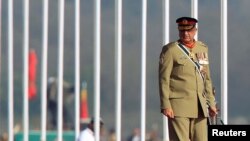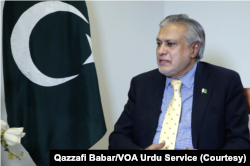Pakistan ordered an immediate investigation Monday into what the government said was an "illegal" and "unwarranted leakage" of confidential tax documents of the family of the country's powerful military chief.
The move came a day after an online investigative news portal FactFocus published a story about the accumulation of wealth and property worth nearly $56 million by family members of General Qamar Javed Bajwa during his extended six-year term in office ending later this month
Pakistani Finance Minister Mohammad Ishaq Dar's office said in a statement he had taken "serious notice" of the leak, calling it a violation of the tax law and breach of official confidential data.
Dar directed the chief investigator officer, an adviser to the prime minister on revenue, to "affix responsibility and submit a report within 24-hours," the statement concluded.
FactFocus alleged in its report Sunday that Bajwa's immediate and extended family members had exponentially expanded their domestic as well as foreign property and businesses since he took command of the Pakistan military in 2016.
The report went on to claim, citing leaked tax documents, that Bajwa's wife transferred funds overseas, making investments in oil business and the real estate, even though she was not an income tax filer until her husband's appointment to the office of the chief of army staff.
A spokesman at the military's media wing, Inter-Services Public Relations, referred VOA to the finance ministry statement when asked for a response to the allegations.
The author of the report is a Pakistani journalist, Ahmad Noorani, who lives in the United States. Pakistani authorities allegedly blocked access to the online portal shortly after the report was published. Noorani also published the alleged wealth statements of Bajwa and his family from 2013 to 2021.
The FactFocus website calls itself a data-based investigative journalist platform. It has previously also published stories alleging corrupt practices of Pakistani officials and politicians while in power.
Bajwa is due to retire on November 29 and Prime Minister Shehbaz Sharif's coalition government said Monday it was in the process of appointing the new military chief, possibly by the end of this week.
Criticizing the military or its leadership is an extremely sensitive issue in Pakistan. The army has staged four coups and ruled the nuclear-armed South Asian nation for about 33 years since it gained independence from Britain in 1947.
Former prime ministers and political parties lately and publicly have been regularly alleging the military institution continues to influence security and foreign policy matters and orchestrates the removal of elected governments if they don't fall in line.
Last month, the Pakistani spy chief, Lieutenant General Nadeem Ahmed Anjum, in a rare, televised news conference, stopped short of admitting the military had until last year been meddling in national political affairs.
"The army had an intense internal discussion, and [last year] we reached the conclusion the country's interest lies in us restricting ourselves to our constitutional role and remaining out of politics," said Anjum, the head of the Inter-Services Intelligence or ISI.
Critics remain skeptical about those claims and stress the need for the military to end its involvement in political affairs if democracy is to take solid root in Pakistan. Politicians are also accused of secretly forming alliances with the military to destabilize and eventually topple governments of their rivals.





